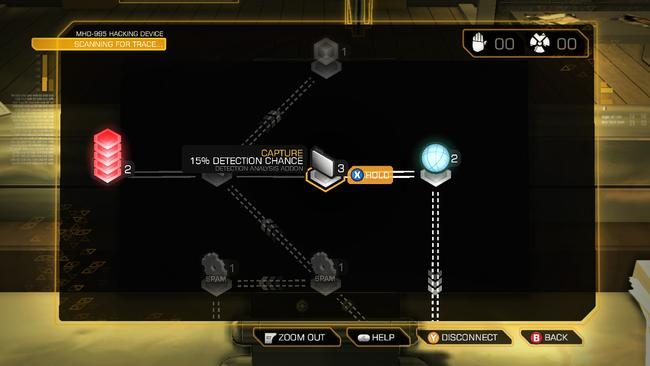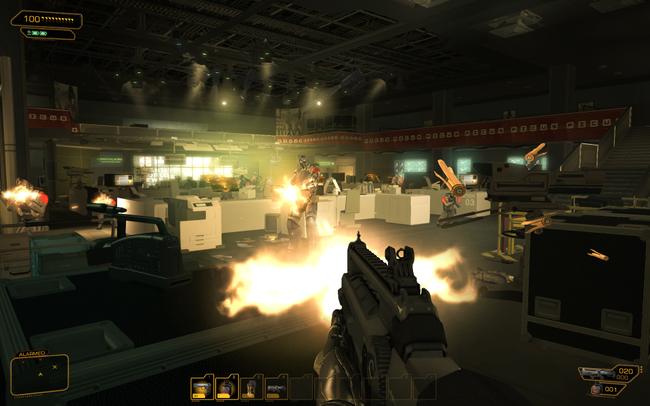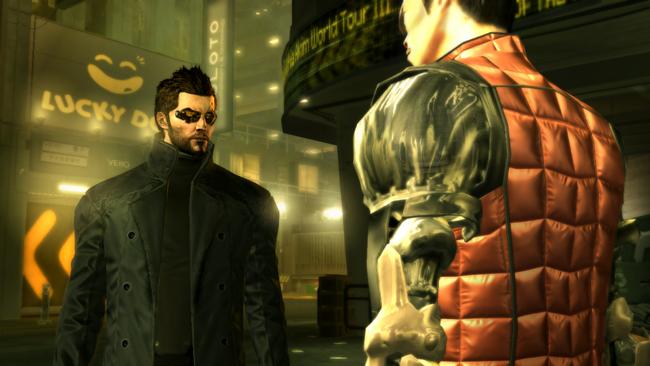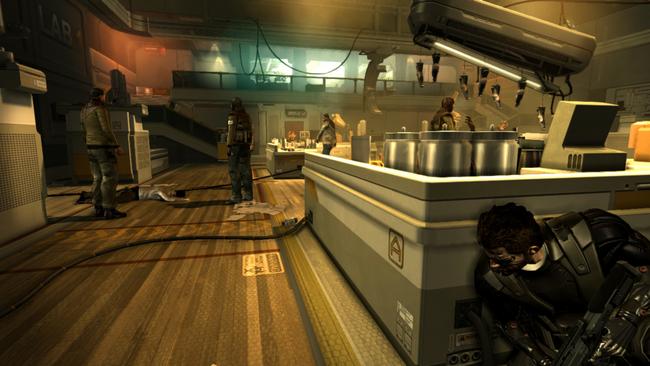
Deus Ex: Human Revolution Review
Upon its release back in 2000, the original Deus Ex was considered a revolution in gaming... its sequel, Deus Ex: Invisible War, not so much - it was panned by critics and fans alike and is regarded as an inferior sequel to one of gaming's all-time classics.
Eleven years later the series returns as a prequel in its latest outing, Deus Ex: Human Revolution. With a new development studio at the helm and after nearly 4 years in the making, can developer Eidos Montreal meet fan expectations?
Before we begin I'd like to clarify that I have never played the original Deus Ex nor its sequel, so I'm going to be looking at this game from an entirely fresh perspective, as many potential users of this game out in the real world will be. Don't be discouraged by my lack of experience with the series, as we'll have a second opinion piece from someone who has played through both and is one of the many who regard Deus Ex as one of the all time greats later this week. I spent my time with the PC version of the game, so all these impressions are from that version. Again, we'll have a look at the other versions later this week.
Deus Ex: Human Revolution has an interesting premise for an RPG—a dystopian, almost Blade Runner-like world set in the future of 2027. You are Adam Jensen, ex-SWAT and newly minted security specialist for bio-tech corporation, Sarif Industries. Sarif comes under attack and as security specialist Jensen is in the line of fire - and he's left nearly dead. That's where human augmentation comes into play. Given a second chance at life by the combination of technology and humanity, Adam must now seek out who is responsible. In that journey he will learn that things, even his own choices, aren't always what they seem.
As with any RPG gameplay is the heart of Deus Ex: Human Revolution. There are four core systems - Combat, Stealth, Social and Hacking, and the differences between these approaches are used to encourage the user to approach any given situation in any way they please. Combat is fairly straight forward: the majority of your time will be spent using guns or other explosive weapons from a first person perspective. You can also switch into third person view for a melee attack or to snap into cover, third person shooter-style. Various upgrades to Jensen's augmentations serve to improve different abilities, allowing you to activate different actions.
Stealth is almost a necessity in Deus Ex: Revolution. It is possible to complete levels by not killing or being seen, which in turn grants you certain XP for finding hidden routes and the like. As mentioned earlier, the game features an extensive cover system which allows Jensen to hide from view when necessary while still being able to use his weapons. Social gameplay refers to the game’s dialogue system. Often times, the player is presented with several choices in any given conversation. You can view each one before making a selection, but be careful that certain choices can and will change the outcome of a situation. This is one area in which multiple play-throughs are highly rewarded.

No western RPG these days would be complete without Hacking. DXHR, being the cybernetic, futuristic game that it is, has you doing a lot of it. Don’t panic, though! Some of the hacking mini-games are completely optional,and the game of course lets the player decide if they want to take that path or not. Hacking also ties in with the Stealth aspects of the game, since it allows you to enter some areas undetected. By using the game’s upgrade system, you can increase the level of terminals you can hack, as well as slow down potential attacks. Purchasing said abilities early on is definitely recommended.
Deus Ex: Human Revolution is all about choice. Not only is it demanded by the gameplay systems, but by the world in which the game is set. Eidos Montreal has completely realized a futuristic 2027, utilizing some of the most impressive art direction in recent times. The story centers around the two hub cities of Detroit and Hengsha, both of which are fully realized as living, breathing towns.
2027 is not a peaceful time, however. In an age where man has embraced evolution through machine, there are those that wish to stop it—no matter the cost. Purity First is one such group you will encounter. They want nothing more than to rid the world of all human augmentation, insisting that the Natural human body is the only true moral choice. The incredibly interesting dystopian world is fleshed out through side missions, e-books and other collectables, as well as the main plot line and dialogue from NPCs.
NPC’s interact with you in big ways. Both cities are filled with people that walk around, and really flesh out the happenings within. Certain NPCs can trigger side quests. Side quests in DXHR are completely optional a good portion of the time. You can choose to ignore them if you so please, but accepting them does offer some rewards. In addition to experience, you’ll also receive what is called Praxis Points.
Praxis Points are what the game uses for its skill upgrade system. Praxis can be obtained in two ways: by earning enough XP to net you one, or by purchasing them with Credits at any local LIMB clinic. Once you have enough, points can be spent on various augmentations such as Cranium, Arm, and Back, each offering different abilities that can improve things such as hacking and strength. You’ll want to keep yourself ready for any situation the game throws at you, so be sure to upgrade often, and do those side quests!
You can tell that this is a game that's been built with the modern market in mind - with PC as the smallest part of the game's potential sales. Like Mass Effect it's clearly built with a controller in mind, but Eidos Montreal have done a good job of ensuring PC players aren't shafted and get a decent control scheme on keyboard and mouse that works just as well as the controller-based counterparts. If you want to play the game as if it's on console but reap the graphical benefits the PC affords, there's also full support for the 360 gamepad in the game.

Just as it portrays an imperfect future, Deus Ex: Human Revolution is not without its flaws. Several issues plague even the PC version that take away from the experience. The first, major one will be talked abut more in the console look later this week, but the load times most definitely end up being one of the biggest offenders. Loading doesn’t occur too often, but when it does, it can take in excess of 20 seconds. If you’re killed in combat, the same also applies. I'm running on a decent PC rig and even there the load times were pretty surprising in length.
Graphically speaking, lower quality models and sometimes stiff animation are saved by utterly fantastic art direction. The character models seem lower poly than what we're used to now - perhaps a factor caused by the long development and advances in these aspects of games since development began, while character movements and facial animations often stiff and awkward, especially in story sequences. The disconnect between the voice work and the facial animation can break the immersion, as can the weirdly stiff way Adam sways back and forth when he's left to idle.

There are also a few gripes regarding the gameplay systems. DXHR claims to let the player ‘choose’ their course of action throughout the game, but the truth of the matter is that it forces you to use stealth more often than not. While it's easy to spec Adam to be more combat-focused, Ammo is extremely limited even in the easier game modes - even though enemies themselves are plentiful, they drop little ammunition. You’re better off just sneaking by the lot of them to conserve everything you have for bigger battles and boss fights.
Those boss fights are another big issue. These battles against powerful, augmented humans are unavoidable and all-out fights of attrition. While the game often uses a lack of ammo to force you into stealth, here it does the opposite - there's no way to stealth or battle these guys in any alternate way - you just have to fight. If you're specced for stealth these difficult battles will become even harder, and the choice to drop these compulsory battles into major story beats in the game seems strangely at odds with the mantra of choice that defines much of the rest of the game.
The last real knock against the game is merelt that you'll be doing a lot of the same things repeatedly throughout the game's duration, which is around 25 hours. That basically amounts to sneak/run, shoot, hide, crawl through vents, move around boxes (really, the game is borderline obsessed with boxes) and hack. The level design is decent, but after a while you tire of the futuristic military-looking corridors and I even sometimes felt overwhelmed as I ended up out of stealth and trapped in a firefight with little ammo and a huge squad of enemies and bots engaging me.

When the concept of choice is handled right, Deus Ex: Human Revolution really shines. Combat situations feel like they can play out in any way, offering far more options to the player than other RPGs which try to combine shooter gameplay with RPG elements such as Fallout or Mass Effect. It is only when that choice is removed or badly implemented that the game loses some of its magic.
The world Deus Ex: Human Revolution portrays is wonderfully realized and fleshed out past the main storyline in sidequests and optional avenues such as e-books. It's a brilliantly imperfect vision of the future that is frightening and engrossing all at once, which makes it an apt thing to compare to the game itself. Like the world it portays, Deus Ex: Human Revolution has imperfections bought about by some very deliberate and questionable design decisions, but the overall package of what it offers is engrossing and well worth exploring anyway.